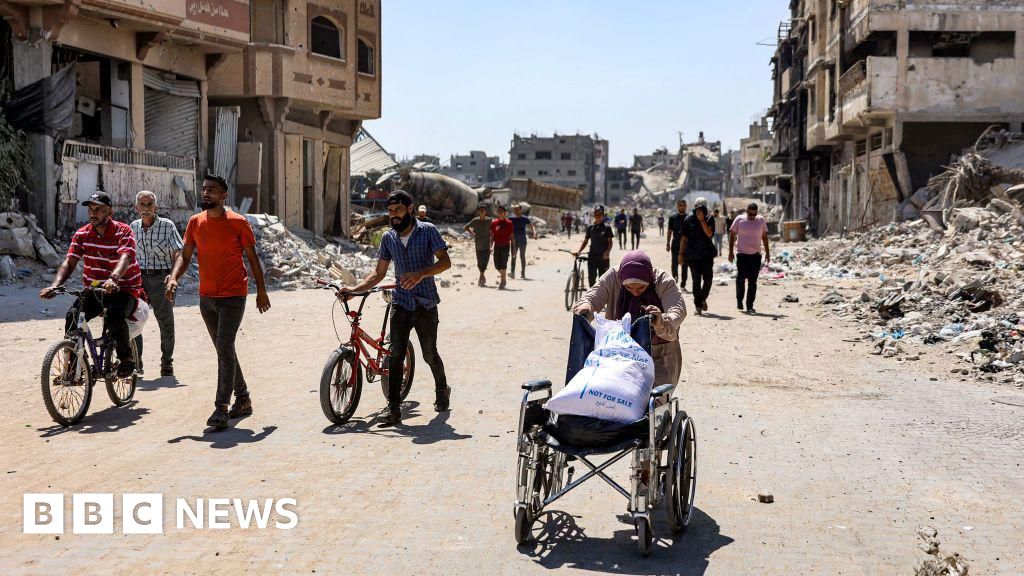
- author, Sebastian Usher and Rushdi Abou El Ouf
- Role, BBC News, Jerusalem and Istanbul
Palestinians in Gaza City say they have been subjected to some of the most intense Israeli bombardment since Israel launched its war on Hamas after the movement’s unprecedented attack on October 7.
Reports indicate that rows of Israeli tanks are approaching the city centre from several different directions.
The Civil Emergency Authority in Gaza says it believes a number of people have been killed, but has not yet been able to reach them due to fighting in several areas east and west of Gaza City.
Reports said the Baptist Hospital was evacuated, with its patients transferred to one of the few medical facilities still operating in the area – the already overcrowded Indonesian Hospital.
Meanwhile, a senior Palestinian official told the BBC that indirect negotiations between Hamas and Israel on a ceasefire and prisoner release are expected to resume in Qatar within 48 hours.
The official said a preliminary meeting would be held in Egypt on Monday between the heads of American, Israeli and Egyptian intelligence agencies.
Prior to the start of the attack on Gaza City, the IDF issued evacuation orders for several neighborhoods in the city center, including Al-Tuffah, Al-Daraj, and the Old City.
But one of the areas that came under the most intense attack, Tel al-Hawa, was not included in the evacuation order that the IDF spokesman posted online in Arabic with a map on Sunday.
This Monday afternoon, the Israeli occupation army issued a new order that included the Tal al-Hawa area, the Sabra area, and the Ramal area, to the north and west.
“The enemy is behind us and the sea is in front of us, where do we go?” asked a resident of Gaza City, Abdul Ghani.
Others told the BBC they did not know where to go, adding that the only remaining route was to head north towards the port area of Gaza City.
Some residents fled their areas after receiving the evacuation order, only to find that the area they had moved to was under Israeli bombardment.
In the Ramal area, a freelance cameraman working for the BBC said he had not received any evacuation orders, but later learned that his neighbour had.
He left the area with his family and headed north. They are now in the port area but lack basic necessities. He says he is struggling to find water for his children.
The Israeli occupation army confirmed in a statement that it launched what it called a new operation in Tel al-Hilweh during the night, following what it said was intelligence information about the infrastructure and fighters of the Hamas and Palestinian Islamic Jihad movements in the area.
The army also added that it operates at the headquarters of the United Nations Relief and Works Agency for Palestine Refugees (UNRWA) in the area.
The Israeli army said that it had issued warnings to civilians since the beginning of the operation, and that it would open a humanitarian corridor to evacuate people from the area.
The latest Israeli attack on Gaza comes as hopes are rising that a ceasefire agreement can finally be reached.
A senior Palestinian official familiar with the talks told the BBC that indirect negotiations between the Hamas and Israeli negotiating teams, mediated by Qatar and Egypt, will begin in Doha within the next 48 hours.
The official also said that a preparatory meeting is scheduled to be held in Cairo on Monday between CIA Director William Burns, Israeli Mossad chief David Barnea and Egyptian intelligence chief Abbas Kamel.
The three intelligence chiefs are scheduled to head to Doha on Tuesday.
The official identified several major points of contention to the BBC from Hamas’s point of view:
- Hamas wants Israeli forces to withdraw from the Rafah crossing with Egypt and the Philadelphi Corridor, a strip of land running along the Egyptian border.
- Israel has rejected Hamas’s request to release 100 senior leaders of the Islamic Jihad and Fatah movements from Israeli prisons.
Hamas’s negotiating team has already dropped its demand that Israel accept a permanent ceasefire as a precondition for any possible agreement.
The official said that the negotiation process will be very long and complicated, but there is some hope that it will succeed this time.
A statement from Israeli Prime Minister Benjamin Netanyahu’s office on Sunday may have tempered expectations somewhat by insisting that any agreement should not prevent Israel from resuming fighting in Gaza until its war goals are achieved.
Mr. Netanyahu has repeatedly defined those goals as the elimination of Hamas, militarily and politically.

“Travel specialist. Typical social media scholar. Friend of animals everywhere. Freelance zombie ninja. Twitter buff.”





More Stories
Taiwan is preparing to face strong Typhoon Kung-ri
Israel orders residents of Baalbek, eastern Lebanon, to evacuate
Zelensky: North Korean forces are pushing the war with Russia “beyond the borders”